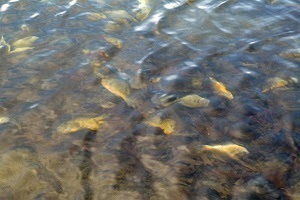
|
Winter conditions – very cold temperatures and heavy snow over ice, for example – can kill fish and other aquatic creatures like turtles, frogs, toads and crayfish. When ice and snow start to melt in the spring, it’s likely that people will begin to discover those deaths.
"Winterkill is the most common type of fish kill," said Gary Whelan, the DNR Fisheries Division’s research manager. "As the season changes, it can be common in shallow lakes, ponds, streams and canals. These kills are localized and typically don’t affect the overall health of fish populations or fishing quality."
Shallow lakes with excess vegetation and soft bottoms are prone to winterkill. When aquatic vegetation under ice and snow dies from lack of sunlight, it uses up dissolved oxygen as it decays, and that creates fish kill conditions. Canals in urban areas also are susceptible due to run-off and pollution from roads and lawns and septic systems, again using up dissolved oxygen through the decay of vegetation and organic materials in sediments.
“Fish and other aquatic life typically die in late winter but may not be noticed until a month after the ice melts, because the dead fish are temporarily preserved on the lake bottom by the cold water. Once the water warms up, bacterial activity results in the dead fish coming to the surface,” Whelan said. “Fish also are affected by rapid water temperature changes due to unseasonably warm weather, leading to stress and sometimes mortality.”
Fish can get easily stressed as they often have low energy reserves in late winter and food is scarce. That equals less adaptability to low oxygen and temperature swings.
Anyone spotting a fish kill in larger quantities – 25 fish or more – should report it using the Sick or Dead Aquatic Species form available under the fish icon at Michigan.gov/EyesInTheField. People also can contact local DNR offices. It’s important to report observations as soon as possible, allowing fisheries staff to collect the best-quality fish for analysis.
For more information, visit Michigan.gov/FishHealth or contact Gary Whelan, 517-284-5840 or Elyse Walter, 517-284-5839.